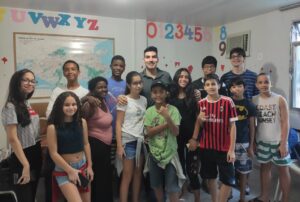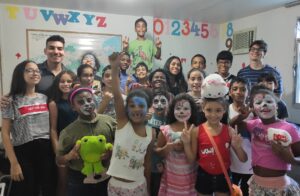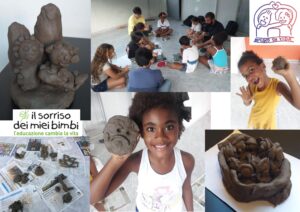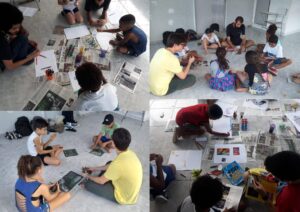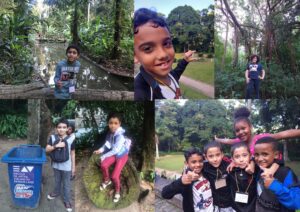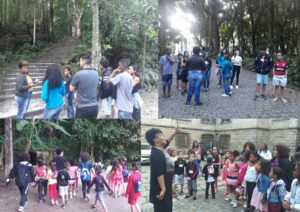Casa Jovem (Young House)
- Cristiano Campari
- October 9, 2020
This post is also available in:
 Italiano (Italian)
Italiano (Italian)  Português (Portuguese (Brazil))
Português (Portuguese (Brazil))
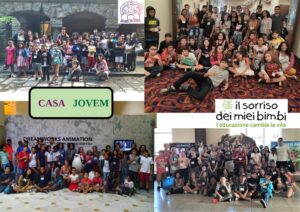 Rio de Janeiro is one of the States in Brazil having a large number of illiterate people, mostly among the inhabitants of the favelas. Brazilian public school is extremely poor and outdated: overcrowded classes, lack of teachers, students acceding automatically to the next class without having basic knowledge; no motivation to study.
Rio de Janeiro is one of the States in Brazil having a large number of illiterate people, mostly among the inhabitants of the favelas. Brazilian public school is extremely poor and outdated: overcrowded classes, lack of teachers, students acceding automatically to the next class without having basic knowledge; no motivation to study.
If we take groups belonging to the lowest classes of the society into account, instruction level dumps considerably; most students leave school without finishing it, this to confirm the strict connection between poverty and low level of education.
This is why “Il Sorriso dei miei Bimbi” promotes the project Casa Jovem ( Jovem House) as an essential instrument to make up for the shortcomings of the “green-gold giant’s” (gigante verde amarelo) education system. It aims at teaching literacy skills and offering educational activities to seventy school children, teenagers and adults.
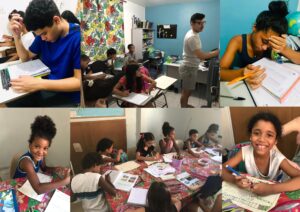 • School support
• School support
Two tutors support children and teenagers with their homework and tests and help them develop or improve their study skills. The tutors follow the pupils throughout, inform their parents about their learning difficulties and, if they need it, the psychologists of the Aldeia project.
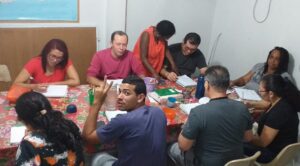 • Adult literacy
• Adult literacy
Creating the basis of literacy process is essential to guarantee better life conditions and social interaction, to encourage self-esteem and awareness of being able to become a creative citizen. Once you learn to read and write, you can move away from alienation and begin to identify yourself as an active citizen in the society you are living in.
• The Aldeia Project
The name Aldeia ( “village” in Portuguese) comes from an ancient African saying: “ It takes a whole village to educate a child”.
The Aldeia project is aimed at the people living in the favela Rocinha ( Rio De Janeiro) and provides individual psychological help, art therapy laboratories and spaces of free expression to the children, the teenagers and the families taking part in this project.
Safe spaces have been built and kept in order to create favorable condition and a friendly environment for everyone. A meaningful work has been done for this troubled community, giving them a chance they didn’t have before.
The Aldeia project is made up of four activities at the Casa Jovem ( Jovem House)
Psychotherapy help and listening
Two afternoons a week are devoted to the meetings with two psychologists. They are aimed at children and young people from 2 to 18 who take part in the project and to their families. The goal is to help children and to create a therapy listening group with their families, too; to give the parents advice about pedagogical and educational needs; to follow vulnerable children and teenagers through the vision and tools of emergency pedagogy.
Laboratory PIPA (Productions of the Imaginary and Applied Psychology).
This lab is held one afternoon a week and aims at developing creativity and imagination through physical exercises, by handling clay and playing games with colours. The lab is for children aged 7-12.
Art therapy laboratories
They take place once a week and are led by an art therapist. The different activities are aimed at encouraging self-expression through art ( design, mandala). The goal is interfacing with the players’ feelings and emotions, getting them to express themselves freely in front of shocks and dangers suffered by the children and their families.
The psychic and emotional health of the learning children depends on the quality of the services which can be offered them and to their families and community in a permanent way and on different levels.
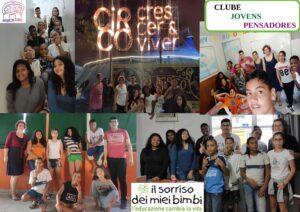 • Clube Jovens Pensadores ( Young Thinkers Club)
• Clube Jovens Pensadores ( Young Thinkers Club)
The Young Thinkers Club started in 2019. It is an activity for teenagers from 12 to 16 that attend the school support, aimed at knowing, thinking, discussing on different issues. It takes place on Friday afternoons.
The approach is participation: the teenagers themselves are involved in creating their activities.
For example, a team chooses its own name, the issues they want to discuss, the ways of their research. Thus the team becomes an experimental laboratory in which they express their wishes, interests, questions, doubts concerning the usual matters teenagers talk about among themselves in everyday life and experience and in their relation to the world surrounding them.
Besides these activities, the project organizes school trips outside the favela with all the pupils and the team of the tutors of Casa Jovem, to take the children and teenagers out of the favela and allow them to meet the culture, civilization and environment of the country from different points of view ( for example, visiting a museum, walking in a park…).

